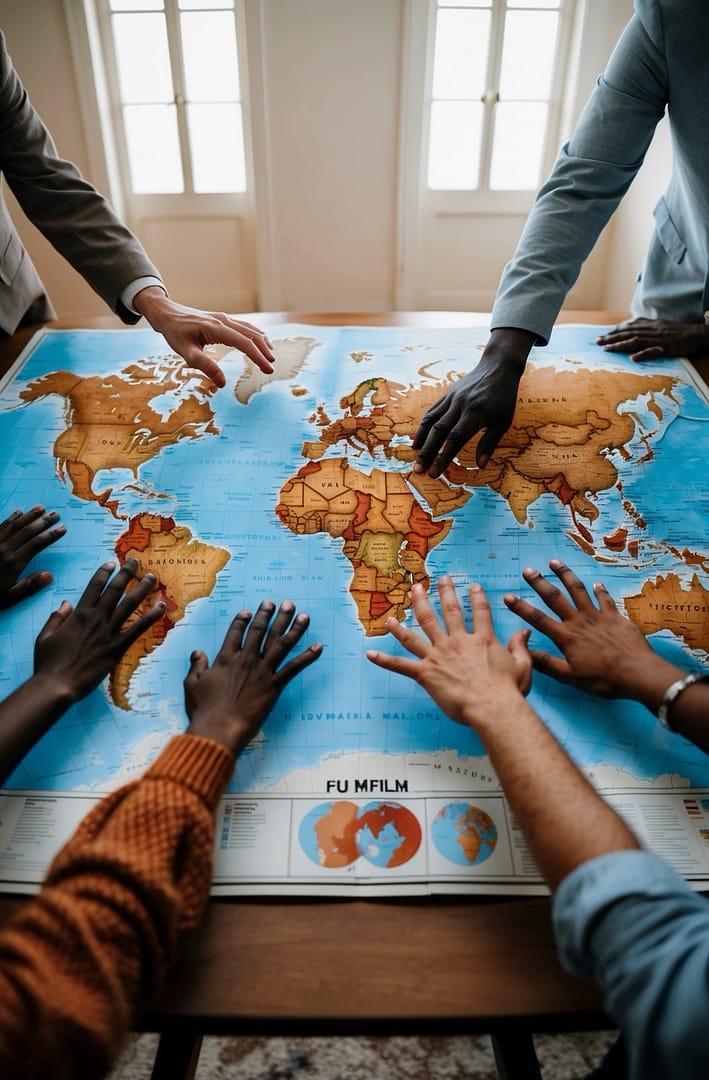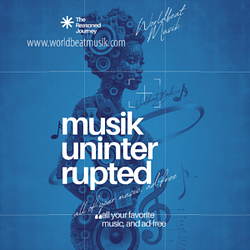We were never meant to be static. The moment the first humans gathered under the ancient African sun, glancing at the horizon beyond their immediate world, the seed of cultural evolution was sown. In time, these seeds would scatter across the globe, carried by the winds of migration, need, and imagination, taking root in places we now call Europe, Asia, the Americas, and Oceania. The story of human culture is the story of movement, survival, and the endless reinvention of our shared myths. It is also a story of separation, of the cracks that form in the earth when one people lose sight of another, when distance hardens like stone between them.
But we need to go back to the beginning—before nations, before religion, before power. Before we could even articulate our own significance, something shifted. We learned to speak not only to the world we could touch but to the world we could only dream. This was our Cognitive Revolution, some seventy thousand years ago, when we unlocked the secret of abstraction, of storytelling, of thinking in ways that would allow us to transcend our limitations. With these powers, we became the singular species capable of imagining things that did not exist—nations, gods, money. And with that imagination came the first threads of culture.
But here’s the paradox of it all: the same imagination that brought us together also tore us apart. As we spread across continents, we crafted different myths. Some began to dream of gods that lived in the rivers, while others looked to the sky. In the fertile valleys of the Nile, early humans discovered the richness of the land and built their culture around it. But somewhere else, on the endless tundras of Siberia, another group learned the bitter lessons of scarcity, of cold winds biting at skin and bone, and their songs carried a different cadence of survival. Culture, it seems, was not only a celebration of our shared existence, but also the shield we lifted to protect ourselves from the unknown—and each other.
As I look across this vast timeline, I cannot help but reflect on the questions people are asking today. Why are human cultures so different? What are the roots of these differences? Why, if we all began from the same origin, do we speak in languages the other cannot understand, worship gods the other does not know? The answers are neither simple nor linear. They are as intricate as the stories we tell ourselves, interwoven through time, geography, and power.
It wasn’t just the Cognitive Revolution that set the stage for cultural divergence; it was also the forces of the earth itself. The land, with its bounty and scarcity, shaped us in ways that left indelible marks on our souls. As we left our ancestral homelands in Africa, we found the world was not one world but many. In the thick forests of Southeast Asia, survival looked different than in the wide, empty plains of the Americas. Geography carved us into distinct peoples—people of the sea, of the mountain, of the desert.
From this diversity of landscape came a diversity of language, and with language, the stories of who we were and who we might become. In the deserts of the Middle East, the harshness of the land demanded a form of culture that leaned on storytelling for survival, encoding wisdom within myths. These myths—of one God, of chosen people, of sacred texts—were later carried like treasure across the sands and into history. Far from the deserts, on Pacific islands where the horizon seemed infinite, the Polynesians developed an entirely different relationship with their gods, for their gods were not distant; they were alive in every wave, every storm.
But as these cultures evolved, they did not exist in isolation. We humans, for all our diversity, are a restless species, always searching, always moving. Empires rose, and with them, the exchange of goods, ideas, and—sometimes violently—people. Rome, at its height, was not just a political force; it was a machine of cultural assimilation. The silk roads that crisscrossed the great expanse between China and the Mediterranean were arteries pumping life into civilizations once separated by thousands of miles. Cultural exchange became inevitable, and with it, the inevitable questions of power. Whose stories were told, whose gods were raised high, and whose were erased?
Today, in the echoes of those ancient roads, we still ask the same questions. How much of who we are is owed to the land we live on? What is the role of migration in shaping who we become? The answers are as complex as our history. Yet, one thing is certain: culture is not fixed. It grows, shifts, and adapts. It was the movement of bodies, the urgency of survival, and the invention of stories that defined it. And in a world where borders seem less and less certain, where migration has reached unprecedented levels, these questions loom large.
What do we do with the vast differences in our cultures? How do we reconcile the fact that we are both one species and many peoples? These questions remind me of something as ancient as the first myths we ever told. The truth is that while culture divides us, it also holds the possibility of connection. At its core, culture is not merely about how we are different—it is also about how we survive together, how we make sense of the mystery of being human.
The Agricultural Revolution, which began some ten thousand years ago, was another moment when our cultures diverged dramatically. As humans began to domesticate plants and animals, new ways of living emerged. Some chose to remain nomads, their lives dictated by the movement of herds, while others settled near rivers, taming the land to suit their needs. This was the beginning of social stratification, of kings and peasants, of wealth and poverty. And yet, it was also the beginning of something more profound—the capacity for long-term memory. In settled societies, humans began to write, and with writing, came history.
But not all histories were written. In the cultures that valued orality, stories continued to live in the mouths of elders, passed down in a living chain that stretched back millennia. These cultures—the ones often silenced by the empires of the world—still speak, though you might have to listen more closely. They remind us that culture is not always about permanence. It is about survival, adaptation, and, sometimes, resistance.
In this moment, as I reflect on what the trending questions reveal, I see a world still grappling with its past. “Why did different cultures develop across the globe?” The answer is both poetic and painful: because we had no choice. Because the earth itself demanded that we change, and because the gods we created whispered different answers to the same questions. And yet, despite these differences, the story of culture is also the story of return—a reminder that no matter how far we stray, the human heart still yearns to understand the other, to find common ground, to imagine new myths that might bridge the spaces between us.
In the end, the diversity of human culture is a testament to our capacity for both invention and reinvention. We are the stories we tell ourselves, but those stories are not fixed. They shift like sand underfoot, leaving traces of what was and hints of what could be. The question now is: What stories will we tell next?
Discover more from The Reasoned Journey
Subscribe to get the latest posts sent to your email.


